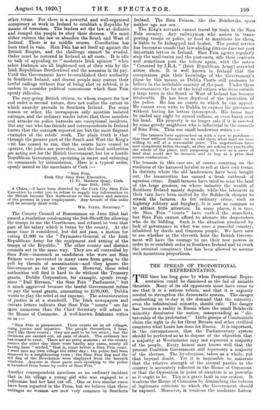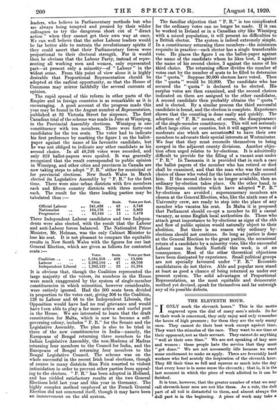THE SPREAD OF PROPORTIONAL REPRESENTATION.
THE time has long gone by when Proportional Repre- sentation could be dismissed as the fad of amiable theorists. Many of its old opponents must have come to see that it is a serious reform, and that it is urgently needed to strengthen the democratic. system. The danger confronting us to-day is the demand that the minority, even the infinitesimal minority, should rule. The danger has become a reality in Russia where the small Bolshevik minority dominates the nation, masquerading as " dic- tatorship of the proletariat." Little groups of Communists claim the right to do for Great Britain and other civilized countries what Lenin has done for Russia. It is important, in the circumstances, that the Parliamentary system should be perfected so as to dispose of the objection that a majority at Westminster may not represent a majority of the people. Every honest man knows well that the present Coalition Government still represents a majority of the electors. The by-elections, taken as a whole, put that beyond doubt. Yet it is impossible to maintain that the relative strength of the several parties in the country is accurately reflected in the House of Commons or that the Opposition in point of numbers is as powerful as it ought to be. This is a grave fault in our system. It weakens the House of Commons by diminishing the volume of legitimate criticism to which the Government should be exposed. Moreover, it weakens the moderate Labov, leaders, who believe in Parliamentary methods but who are always being tempted and pressed by their wilder colleagues to try the dangerous short cut of " direct action when they cannot get their own way at once. We can well believe that the sober Labour leaders would be far better able to restrain the revolutionary spirits if they could assert that their Parliamentary forces were proportional to their electoral strength. For it would then be obvious that the Labour Party, instead of repre- senting all working men and women, only represented part—at present only a minority—of " Labour ' in the widest sense. From this point of view alone it is highly desirable that Proportional Representation should be adopted at the earliest opportunity, so that the House of Commons may mirror faithfully the several currents of opinion. The rapid spread of this reform in other parts of the Empire and in foreign countries is as remarkable as it is encouraging. A good account of the progress made this year may be found in the August number of Representation; published at 82 Victoria Street for sixpence. The first Canadian trial of the scheme was made in June at Winnipeg, in the Provincial Assembly elections. Winnipeg is one constituency with ten members. There were forty-one candidates for the ten seats. The voter had to indicate his first preference by marking the figure 1 on the ballot- paper against the name of his favourite candidate, but he was not obliged to indicate any other candidate as his second choice. In all 48,246 votes were recorded, and only 819 ballot-papers were spoiled. It was generally recognized that the result corresponded to public opinion in Winnipeg, and other cities and provinces in Canada are now taking steps to adopt " P. R. either for municipal or for provincial elections. New South Wales in March elected its Legislative Assembly by " P. R." for the first time. There were nine urban districts with five members each and fifteen country districts with three members each. The result for the three leading parties may be tabulated thus: Three Independent Labour candidates and two Indepen- dents were also elected, with the result that the Labour and anti-Labour forces balanced. The Nationalist Prime Minister, Mr. Holman, was the only Cabinet Minister to lose his seat. It is not pleasant to compare the equitable results in New South Wales with the figures for our last General Election, which are given as follows for contested seats
Votes. Seats. Votes per Seat.
Coalition .. .. 5,564,318 .. 428 .. 13,000 Labour .. . . .. 2,292,102 .. 47 .. 48,768 Independent Liberal . . 1,282,122 . . 25 .. 51,284
It is obvious that, though the Coalition represented the large majority of the voters, its numbers in the House were much exaggerated by the system of single-member constituencies in which minorities, however considerable, were entirely ignored. Had the 500 seats been divided in proportion to the votes cast, giving 306 to the Coalition, 128 to Labour and 66 to the Independent Liberals, the Opposition would have had no real grievance and would have keen able to play a far more active and useful part in the House. We are interested to learn that the draft constitution for Malta, which is now to become a self- governing colony, includes " P. R." for the Senate and the Legislative Assembly. The plan is also to be tried in three of the new constituencies in India—namely, the Europeans of Bengal returning three members to the Indian Legislative Assembly, the non-Moslems of Madras returning four members to the Council for India, and the Europeans of Bengal returning four members to the Bengal Legislative Council. The scheme was on the whole successful in the recent Irish local elections, though of course in many districts Sinn Fein resorted to violent intimidation in order to prevent other parties from appeal- ing to the electors. " P. R" has been adopted in Holland, and has yielded satisfactory results at the two General Elections held last year and this year in Germany. The highly complex method employed at the French General Election did not commend itself, though it may have been an improvement on the old system.
Votes. Seats. Votes Per Seat.
Official Labour .. 241,438 .. 42 .. 5,748 Nationalist 164,176 . . 28 5,863 Progressive .. 82,185 .. 15 .. 5,479
The familiar objection that " P. R." is too complicated for the ordinary voter can no longer be made. If it can be worked in Ireland or in a Canadian city like Winnipeg with a mixed population, it will present no difficulties to a British elector. The system is indeed extremely simple. In a constituency returning three members—the minimum requisite in practice—each elector has a single transferable vote. He places the figure 1 on the ballot-paper against the name of the candidate whom he likes best, 2 against the name of his second choice, 3 against the name of his .third choice. The returning officer divides the number of votes cast by the number of seats to be filled to determine the " quota." Suppose 30,000 electors have voted. Then the " quota " would be 10,000. The candidate who has secured the " quota " is declared to be elected. His surplus votes are then examined, and the second choices indicated on them are assigned to the other candidates. A second candidate then probably obtains the " quota " and is elected. By a similar process the third successful candidate is found, and the election is complete. Experience shows that the counting is done easily and quickly. The adoption of " P. R." means, of course, the disappearance of the single-member constituency. This will not seriously affect large cities or counties, but it will aggrieve towns of moderate size which are accustomed to have their own members to advocate their special interests at Westminster.. We fear that they must reconcile themselves to being merged in the adjacent county divisions. Another objec- tion often urged relates to by-elections. It is admittedly difficult to provide for the filling of a vacant seat under " P. R." In Tasmania it is provided that in such a case the ballot papers of the member who has retired or died shall be examined, and that the man who was the second choice of those who voted for the late member Shall succeed him. If the second choice is no longer available, then an ordinary by-election takes place. On the other hand, in the European countries which have adopted " P. R." by-elections are avoided ; supernumerary members are chosen at the General Election, who, like the ninth man of a University crew, are ready to step into the place of any member who vacates his seat. In Malta it is proposed that Parliament should co-opt a member to fill a casual vacancy, as some English local authorities do. Those who attach great importance to by-elections as signs of the ebb and flow of public opinion would naturally object to their abolition. But there is no reason why ordinary by- elections should not continue. So long as justice is done at the General Election to the great parties, the occasional return of a candidate by a minority vote, like the successful Labour man in South Norfolk this week, is of no consequence. Most of the other theoretical objections have been dissipated by experience. Small political groups are not specially favoured under " P. R." Eccentric candidatures do not thrive. Able and popular men stand at least as good a chance of being returned as under our present system. The solid advantages of Proportional Representation, as the most equitable and democratic method yet devised, speak for themselves and far outweigh any of its possible defects.



































 Previous page
Previous page